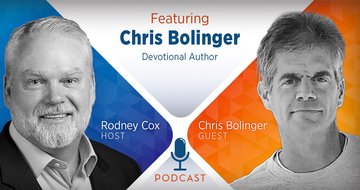Let’s look at that one key factor that most often determines success in church consultations. You might be surprised.
Jesus never intended for the church to be a subculture but, rather, the counterculture. The church was not meant to assimilate itself into society, but to change society by transforming its cities.
Here are 10 life lessons learned I’ve learned during the past several months of my very busy season of life.
Leaders solve problems. And whatever problem you’re facing, clarifying your thinking is always the first-step to move you towards a solution. Such clarity of thought became something of a lifeline when I encountered a serious problem in a small airport in an impoverished country in east Africa.
I think it comes down to this one thing: can you be a pressure-washing expert and a pastor, too? Is there a ministry in pressure washing people's stuff?
Dreams often take a long time to come to fulfillment. God’s Dreams, like Joseph’s, are worth the wait, however long they take.
Our guest today is best-selling author and podcaster, Chris Bolinger. In addition to his duties as the co-host of the Throwing Mountains podcast, Chris is the author of the popular devotional titled, Daily Strength for Men -- which has sold over 300,000 copies.
Ending your day well might be the key to beginning the next day well.
If you don’t have an authority and a standard by which actions and attitudes are judged, you will never have integrity—personal or corporate. Relative truth doesn’t work; it’s another name for compromise.
Notice how Jesus fulfills each of the characteristics of an effective counselor.
Believer, I pray you’ll have an opportunity to share the gospel with a co-worker today. But even if you don’t, please know that today can still matter greatly for eternity.
On the one hand, I am hopeful for local congregations. I continue to see God working in countless churches. On the other hand, I see numerous warnings, more than I can remember in my lifetime. I call those warnings “fault lines.”
Personal development is leadership development. Taking care of your body is justified. It is worth the time and effort. It’s an investment, not a luxury. It’s part of how you lead well.
A key leadership aspect that can greatly impact a ministry is finding a niche. A discovered thought area where you can flourish and become an expert.
Use these tips to build your resilience and unlock the door to leadership.
One of the biggest communication issues many of us face is truly listening to people rather than simply waiting for a long enough pause for us to be able to spew out our opinions (and if a pause doesn’t come, we just butt in regardless).
As a pastor, the past mistakes can truly haunt us, and feels like they can destroy our very being. Yet, be encouraged, you are purchased and redeemed by Christ who came and died for you.
If we can choose to bless a company being driven, directed, and guided by a person who loves Jesus, then that is a business I want to support, and I'd love you to support, too.
As our bodies age, so do our brains. Fortunately, we don’t have to let our brains atrophy as we age. Here are some choices we can make to help keep them sharp.
Our sinful hearts create an inner self that looks after its own.






















